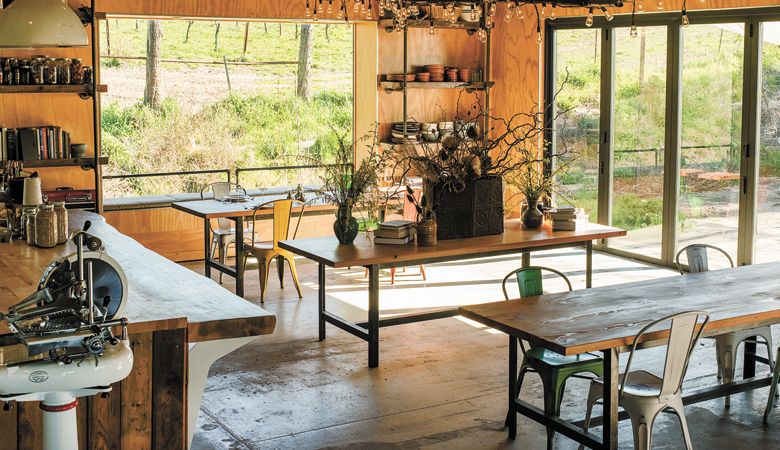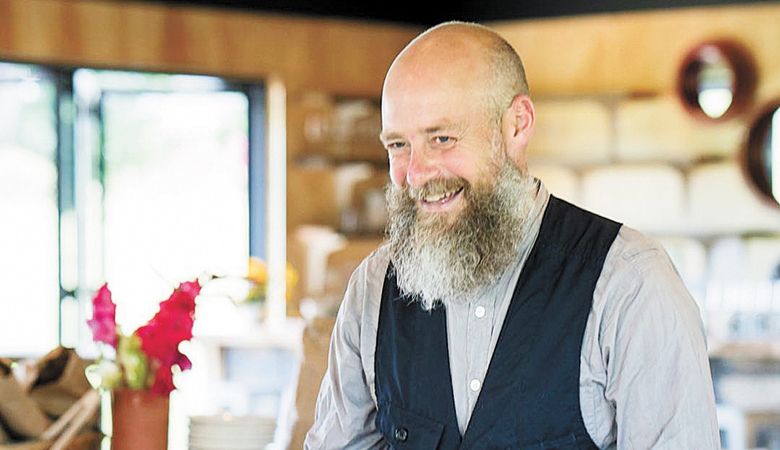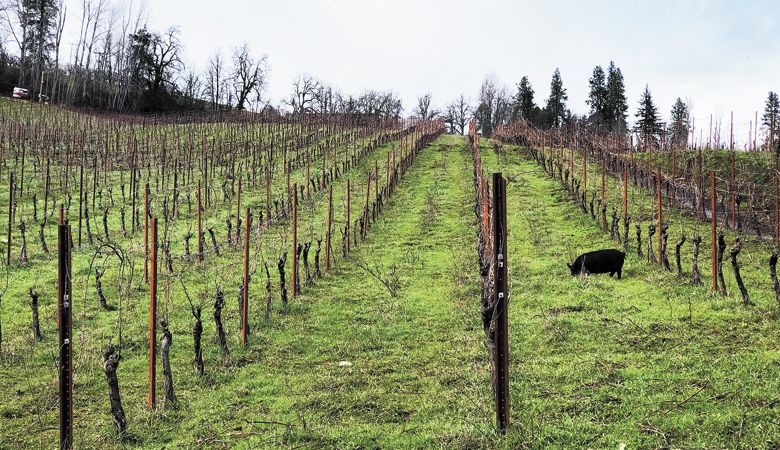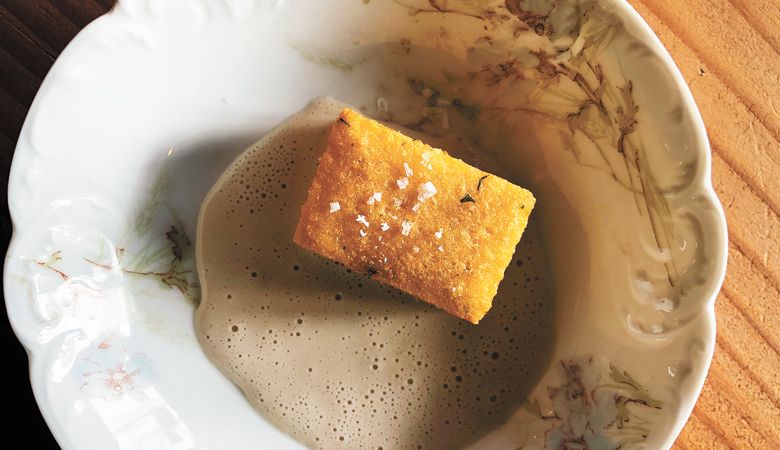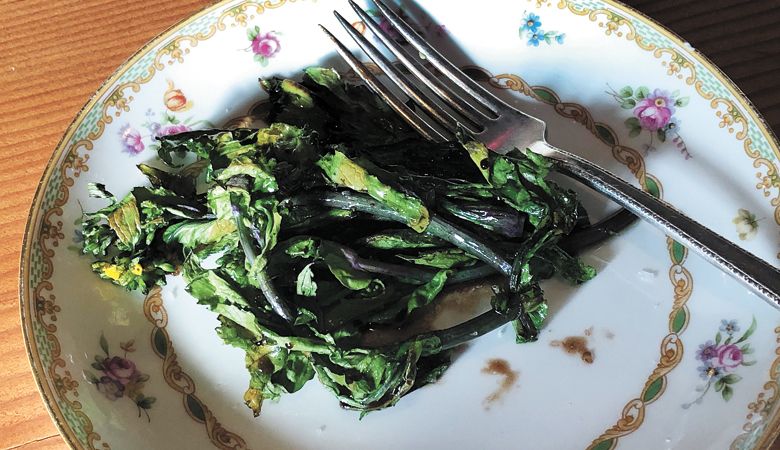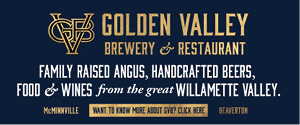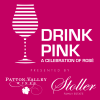Hiyu on the Hog
Gorge winery links land and table with simplicity
Driving east from Portland on a drizzling winter afternoon, I see the flanks of the Gorge rise on both sides of the slate-gray Columbia River. Soft mists envelop forested crests and contours, punctuated by crumpled basalt and silver waterfalls.
To thrive in the Pacific Northwest, you must embrace the seasons and cherish what each one brings, a philosophy on full display as I arrive to my destination: Hiyu Wine Farm in Hood River. The sleek industrial exterior is surrounded by skeletons of cardoons and a bird’s nest clinging to tangled vines of hardy kiwi. The landscape acknowledges the season with authentic fervor.
Similarly, the interior is adorned with the natural, subtle hues of dried wild grasses, weeds and flowers. Spiky teasel, bristling cardoon blooms, dried roses, gourds, acorns and rose hips indicate the tail end of the season’s dormant period, as does the menu. A pile of split firewood and live-edge planks forming the backrest of the banquettes add to the overall organic feel.
Naturalistic Philosophy
Here at Hiyu, natural order reigns. The vineyard cultivation is based on “a particular variant of perma-culture that was developed in Japan by a man named Masunobu Fukuoka,” explains winemaker Nate Ready. “It’s a more naturalistic style in which you allow the plants to complete their life cycle uninterrupted. You let the plants flower and go to seed and desiccate in the field. So, you don’t mow or till, and you get animals to do a lot of the work for you.”
As if on cue, directly above Hiyu Wine Tavern, a black pig grunts happily as it feeds at the base of a vine. A pair of reclining cows look on from a few rows down. “They’re providing all the fertility, but also controlling ground cover and providing opportunities for new plants to grow and things like that. That’s a little unusual; there aren’t many wineries applying this style to viticulture. Although that’s changing, it’s becoming more and more common.”
Hiyu is truly diversified, home to vegetable gardens in addition to livestock and vines. Home-grown and hyper-locally sourced produce are critical to the types of repast offered.
I’m here for the Tavern Tasting, pairing six fermented beverages with six small samples “offering a meditative survey that spans our vineyard, vegetable and forest gardens, animals and community of local growers and partners,” according to the website. For more substantial fare, try the Wine Farmer’s Lunch, family-style meals celebrating Hiyu’s bounty.
I take my seat in the spacious Wine Tavern where an open kitchen designed with white tile, stainless steel and reclaimed wood stars centerstage. Past the bar, glass doors reveal a warehouse stacked with wine barrels marked with chalk and masking tape.
My first pour, Floréal Cider, represents a collaboration between Hiyu and the Jacobson family, who farm a Biodynamic orchard at the base of Mount Hood.
“One of the things that’s really important to us is making cider. It’s a historic orchard valley, and we want people to taste what’s possible other than just eating fresh fruit,” explains Ready. Up to 50 varieties of apples combine with pear and quince. In a basket press, the fruit is wrapped in straw, pressed and placed into barrels, a traditional method. The cider ages in oak for a year. Ready explains, “Normally, ciders are made to sparkle either by forced carbonation or by adding sugar and yeast, but we use the fermenting cider from the next vintage to re-ferment it in bottle and make bubbles. It’s just a really dry, aromatic rustic cider that is reflective of the fruit growing in the [Hood River] Valley as a whole.”
Paired with the cider, a few jewel-toned leaves of chicory slicked with anchovy dressing and the crunch of sea salt, are served on vintage floral china with mismatched silver-plated flatware. Each subsequent plate embodies the season: a beautifully crusted ingot of panisse (a Mediterranean street snack made of chickpea flour) on a bed of tahini sauce; a crusty fingerling potato from Wildwood Farm perched on a generous dollop of aioli; mustard raab gently seared and dressed with an exquisite red wine sauce; an earthy chunk of beet anointed with an emulsion of beef garum (fermented sauce from ancient Rome); and a finale of hard sheep-milk cheese served with a dab of quince jelly.
A Sommelier’s Touch
After a career as a master sommelier in celebrated restaurants like The French Laundry and a spell learning the craft at other wineries, Ready joined forces with China Tresemer and Geoff Burke to launch Hiyu Wine Farm in 2010.
Hiyu plants a variety of grapes together and also grafts with abandon, a practice reflecting older winemaking traditions that were supplanted by single-varietal planting and labeling in the 1960s and ’70s. These field blends ensure biodiversity and resilience as well as complex, adventurous flavors.
Low-tech processing is part of the package. “We look sort of like a preindustrial winery, so there are no pumps. We use basket presses and move the wines with buckets, and everything’s aged in old wood. If you went into a small village in pre-World War II, the winemaking would look really similar.”
In traditional fashion, they don’t de-stem the fruit. Ready explains how mechanized pressing extracts bitterness from the stems. So, they foot tread instead. “The other reason we work that way is that the best wines in the world are all made like that. This is one of those things about being a sommelier is you’re sort of aware what the practices are like at the best domaines in the world. We try to work in a way that’s similar because we’re interested in that kind of result.”
Ready’s sommelier sense woven into his winemaking recently earned Hiyu a nod from the James Beard Foundation, specifically a 2022 Semifinalist for Outstanding Wine List.
Honoring the Land
This purity of practice dovetails with Hiyu’s holistic, idealistic philosophy. “The whole push behind it all is connecting people to all the different processes that are happening on the land, in the form of a meal, a taste experience. So, the wine’s role is really to support that effort, and then we make sure what we’re doing in the vineyard with the animals and the way we practice and sell is consistent with that,” says Ready.
“What we’re most excited about is more hands-on attention to the land, encouraging more human contact with smaller pieces of land and less mechanization and abstraction. The modern environmental movement has gotten all this really wrong. They were really focused on keeping human beings out of the natural world, which creates this scenario where people don’t care a lot about it because they’re not in touch as much.
“We’re really interested in anything that can increase human contact with nature, so rather than having this dichotomy between natural and cultivated zones, the line is not as clear between the cultivated and the uncultivated, to really encourage people getting more curious and touching stuff.”
Ready continues, “We’d like to serve as an example of someone doing something kind of strange and unique on a small piece of land that’s reflective of what we’re interested in, in the hope that more people would do, not what we’re doing, but just go back to the land and feel free to do something different instead of just following a formula, or failing to engage at all.”



